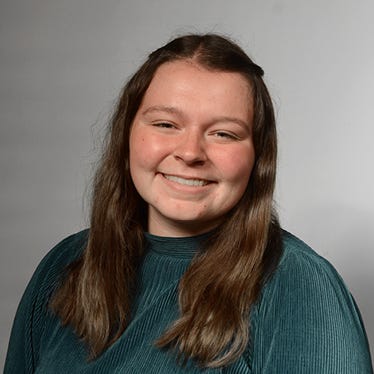
While being an advocate helps shine light on often-avoided topics, it can be hard to listen to your own advice. Nathan Brown, a farmer from Hillsboro, Ohio, learned that firsthand when his mental health took a hit two years ago.
Brown’s farming mentor died, catapulting him into a sea of depression where it seemed impossible to resurface. He had participated in various mental health training events and was a well-known advocate on the subject, but he found it difficult to apply what he knew to his own life.
“It’s easy to tell somebody else what to do,” Brown says. “But when it comes to yourself, it is so much harder to actually put into motion.”
Brown’s wife, Jennifer, was the final push in him seeking help. She reminded him that he had already done so much to shed light on the mental health of farmers.
“I was doing all these great things for all these other people, but I wasn’t taking care of myself, and I needed to prioritize myself,” Brown adds. “Really, my wife pushing me was the one that really got me to say ‘OK, I will make the appointment this afternoon, and I will get this lined up.’”
Brown started his journey by meeting with the family doctor. His previous mental health training made it easier to be upfront about asking for possible medications and seeking counseling. Soon, he was on the road to recovery and back to helping others.
Be proactive about mental health
Brown credits a large part of his healing to already having knowledge about what to do when difficult situations take a toll on your mental health. He was able to identify some of those warning signs early in those darker days.
“I knew that I was not in full crisis, but I knew that I was getting closer and closer, and I needed to do something to help myself,” Brown says.
The training that helped him recognize the situation he was in included Question, Persuade, Refer and mental health first-aid training. QPR is a three-hour course that helps you ask questions to assess someone’s condition, persuade them to seek help and refer them to the right resources. The training is hosted through a variety of organizations and universities, including Purdue.
“It’s a really easy training for spouses and ag professionals,” Brown says. He adds that ag businesses and ag organization staff should all be trained in QPR because they interact with farmers often and can catch some of those early signs.
Mental health first-aid training is a more in-depth course that provides tools to help somebody until you can get them professional help. Being trained in this area can give you the resources you need to identify more serious situations and keep things at bay until help arrives.
“This is ‘let’s stop the bleeding and get you to where you need to be to receive professional help,’” Brown adds.
Why farmer started speaking up
Brown began speaking up about mental health in 2017 after becoming more involved in different roles and organizations, which made him realize just how poor the condition of mental health was in rural America.
“Throughout my travels and going to meetings back in those days, I started feeling and noticing the downturn of mental health in the ag community,” Brown says. “We had come off the high prices of the early teens, and things were kind of going the opposite direction. I noticed the mood people were in was just not the same.”
Brown soon made it his mission to speak out on the topic and share resources wherever he went. He adds that it didn’t matter what topic he was talking about at meeting — he would always fit mental health into the conversation.
However, he hit a point where he wanted to become better equipped to identify warning signs and help people. That was when he sought out mental health training. Since then, he has been able to help countless friends, neighbors and attendees he has met at meetings.
Be selfless
Brown explains that a large barrier to helping others with their mental health is the idea that people need to keep to themselves and not concern themselves with others’ business.
Beyond that, farmers are in a unique position because they’re in constant competition with their neighbors. This can make it difficult to share what they are experiencing, because those mental health problems they are facing could be used against them later.
“That’s ammunition that my next-door neighbor might have,” Brown adds. “I might not get to rent a piece of dirt because I talked about this, or I said this, or I’ve experienced this.”
He shares that other issues could arise when working with bankers to apply for loans or when competing with neighbors to pick up more land. However, Brown says that caring for each other, looking for those warning signs and speaking up trump any competition, adding, “That’s something that we’ve got to get over, because I don’t want to go to anybody else’s funeral.”
Indiana Farm Bureau offers DIY help
On-demand mental health resources are becoming more prevalent as more people shine light on rural mental health challenges.
“It’s part of our overall health to address mental health challenges,” says Megan Ritter, senior executive director of administration at Indiana Farm Bureau. “And yet, farmers still have some sensitivity around it, so how do we make these resources available in a DIY space so that people can have access to them when they need them in the comfort of their own home?”
The INFB homepage does just that. Farmers and their families looking for mental health resources can head to infb.org. On the Mental Health Resources page, they will find a variety of options, ranging from warning signs of stress to links that lead to university resources, hotlines and chatrooms.
Earlier this year, the American Farm Bureau Federation partnered with Togetherall, an anonymous chat service that allows participants to receive and provide support. Through this collaboration, Farm Bureau members can reach out to this online community to share experiences and gain support.
INFB and AFBF continue to assess their farmer-members’ needs so they can match those needs with the correct resources and ensure people have what they need to thrive.
“No matter how many people are using the resources, if it’s one person that gets the information that they need in a time of need, then it’s worth it,” Ritter adds.
To learn more about INFB mental health resources, visit infb.org. For more information on Togetherall, visit togetherall.com.
About the Author(s)
You May Also Like






